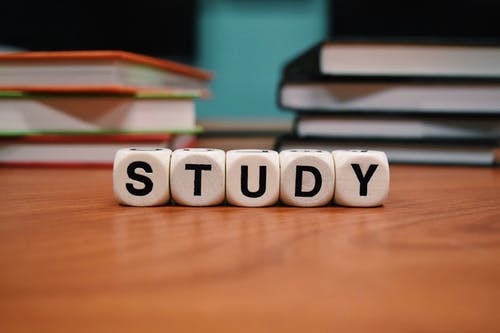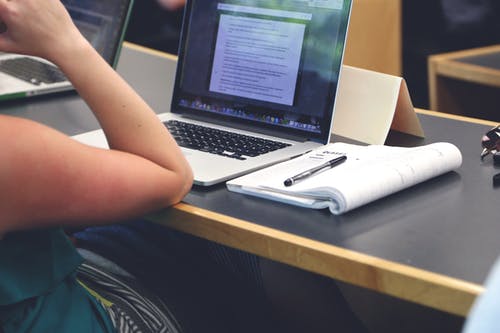
Study Tips for Finals Week
As the school years winds to a rather unusual end, final exams still loom on the horizon, dark and menacing. As this article goes out, I will be sitting at my desk in front of an Organic Chemistry exam and drawing on everything I have ever learned. Organic Chemistry has defeated me before, but this time around I know I will prove the victor. With two decades as a student and over one decade working as a tutor, I have used every study technique in my arsenal to conquer the subject at hand.
As such, I thought it only fitting that I share some of my top tips and study techniques.

What follows is a sneak peak of a project that has been in the works for quite some time. Stay tuned for more our upcoming projects by following The Nerdy Nanny on Facebook, Instagram or YouTube.
When Studying for Finals Break Subjects into Manageable Chunks
If you have been given a review sheet, use it. Honestly, I know it sounds simple, but so often most of the stress of tests is in dealing with the unknown. We are given test outlines and review sheets for a reason. The subjects covered are the ones on the test. Use this as your reference guide when studying.
If you do not have a review sheet, use what you DO have at your disposal. Past tests, previous assignments, even old homework can all be used as a guide for what your teacher is expecting you to know and be familiar with. Nine times out of ten, if your teacher has bothered to give you an assignment or homework on a subject, it is because they want you to know it.

On a separate sheet of paper create a list, from the review sheet or past assignments, of subjects that are expected to be on the test. If it is a subject that you have struggled with in the past, star, highlight or point them out in some other way if just to yourself. We are going to use that list of subjects to create the basis of our study outline.
Most of your subjects can then be broken down into smaller and more manageable chunks in a couple of different ways.
The simplest method is by unit, chapter or section. This obviously works best if your teacher is drawing from a singular textbook. You can then break it down by sections, paying special attention to the sections your teacher emphasized or assigned homework on.
Example – Final Exam covers Ch 6 – 10 in Earth Science.
Using online resources or multiple resources makes that a little harder but it is still possible to break things down into general sections based on topic. Some of the subjects will undoubtedly overlap a little, but you should still be able to create a few broad topics from them.
Example – Layers of the Earth, Tectonic Plates, Types of Volcanoes.
Phone Away While Studying
If there is a single thing that teachers will agree on, it is that students need to PUT AWAY THEIR PHONES. The instant satisfaction of easily accessible distractions at our disposal has made paying attention, staying focused, and tackling difficult subjects even more difficult than it needs to be.

It is all too easy for us to grab that familiar screen in an instant of inattention and then thirty minutes have gone by scrolling through social media or playing games before we have even noticed. What is even worse is the painful process of trying to draw our attention back to the subject at hand after going down a digital rabbit hole.
While turning your phone completely off is not always an option, putting your phone upside down and out of reach is a good start. Leaving it in the next room is even better. Tell yourself your battery is dead and you need to charge it if that helps, but keep your phone out of your line of sight for an hour at least.
Studying for Different Subjects Requires Different Methods
Every subject is different, and every student is different. What works for one person may not necessarily work for another. What is important is finding the system or study method that works best for you. While this is crucial for academic success and being confident and comfortable in new subjects moving forward, finals week is not really the time to experiment with new study techniques.
While students may have greater success with some methods than with others, certain techniques generally work better for certain subjects.
Studying – Memorization
This includes vocabulary terms, important names and dates, formulas, or anything else you just need to be able to remember at the drop of a hat. Flashcards, as tedious as they can be, really are the best solution.
Quizlet is a useful tool here. Once the cards are made for a certain study set, the program will keep track of your familiarity with each card, you can flip through them ten minutes at a time. You can use them in backward, forward, or by matching. Which is a great way to mix it up and help improve retention and not just that you are recognizing the card.

*Parents, do NOT ‘help’ students by making the flashcards for them. Reviewing the material as you create the cards is part of the process.
Study – Application
There are some subjects which you just learn by doing. Also known as– practice problems. Especially helpful in math, most notably. Using your review sheet as a guide to direct you to sections of the text is a great way to find practice problems. For example, if your geometry review sheet says includes something for volumes of 3 dimensional shapes, and volume of 3 dimensional shapes is in chapter 10, go through chapter 10 and try the practice problems inside of and at the end chapter
Study – Concepts & Note Taking
When you take notes you are looking for vocabulary terms, which you can make cards from later, names and dates, which you can also make cards of, and concepts. If a text pauses to explain something to you in detail, repeats it more than twice, or includes it in a section title, you need to put it into your notes. But copying down word for word is not enough.
Copying directly is a form of passive learning, which is what most of us do, and is mentally easier but generally not as effective, meaning it takes more hours for less result. Active learning is all about interpreting that information, taking the concepts and definitions in the text and putting it in your own words. This is especially important in subjects like History or Science where you need to have some knowledge of context.

Even if you think you have studied but still don’t feel comfortable with it, go back to your textbook and take personalized notes. Often times the active process of re-framing information helps more than a simple review.
Some classes will require multiple techniques within the same subject. That is completely normal and even expected. For example, science involves vocab, application, and concepts. In Chemistry, you need to know what an electron is, how it interacts, and how to calculate the charge or mass of a molecule.
Set a Timer while Studying to Keep Focused

Now that the subjects are broken down into manageable chunks, setting your timer for twenty to forty-minute intervals. This not only helps you to stay focused on a set amount of time but also provides an escape route. When the timer goes off, you get up, stretch, grab a snack, and then switch to a different subject. The fact that you only need to keep going for a set amount of time means that, before you know it, you’ll be home free.
For more on this, you can check out this VIDEO on 40/20 and block time schedules for studying in quarantine.
Prioritize Studying based on which Finals Exams are most Critical
This will be a controversial bit of advice, but not all your final exams will need or even deserve the same amounts of attention.
In the beginning of the year you should have been given a grading rubric for all of your classes which will tell you how much your tests and final will be worth versus your quizzes and homework. It is possible to calculate the minimum grade you need on a final to get the grade you would like in a class.
[Your Current Grade x % of grade] + [Final Exam Grade x % of grade] = Your Final Grade
Let’s say you have an 87 in your Science class right now but the final exam is 20% of your grade. You can solve for the grade you would need on your final in order to get an A but also the grade you would need in order to keep your B. Unfortunately, in this case, you would need over 100% on the final exam in order to get an A, which just is not possible (unless your teacher is prone to giving out lots of extra credit points). The good news, however, is that if you get more than a 52% on your test you will still have your B in the class. Given that, your time is probably better spent studying for another subject.
Preparing for finals can be a stressful and overwhelming endeavor. Help yourself out by breaking subjects into manageable chunks, using the best strategy for that subject, and prioritizing where you should be concentrating your study efforts.
Above all else- don’t panic. Final exams can seem daunting, but they are only one part of a single class. Knowing where to put your time and energy can help, but ultimately it comes down to trusting yourself and that, no matter what, you have done the best job possible to prepare. So put down your phone, dig up that review sheet, and get started.

If you get stuck or need more help with studying, reach out to us on Facebook, Instagram, or by emailing contactus@thenerdynanny.com
